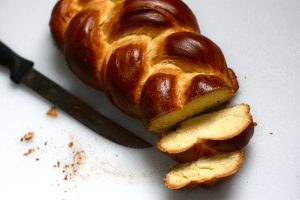There is a debate about the proper way to cut challah bread when cutting it for a group of people sitting at the table. May you cut pieces for everyone at first, or must you cut only for yourself, eat a little, and then cut for everyone else? And then there are variations in between. A neighbor of Bobov ancestry told me that his father has a letter from the previous Bobover rebbe saying that, based on kabbalistic sources, one may initially cut an extra piece for one’s wife. Others cut a bunch of pieces and then the leader takes the last piece, implying that he had to cut all those pieces just to get to the one that he wants. And so on, with many variations. None of this is my minhag.
The Gemara (Berachos 47a) says that when one person is reciting the ha-motzi blessing on the bread for everyone at the table, the others may not eat until the one who recites the blessing takes his piece of bread. The implication is either that the others may not take bread before the leader takes his piece or that they may not eat until he eats first.
Tosafos quote the Sar (R. Shimshon) from Coucy who ruled the first way, that people should not take their pieces of bread before the leader. But if he hands the pieces out, they may eat first. However, the Rambam and others rule the second way, that they may not eat first.

The Shulchan Aruch (167:15) quotes the words of the Gemara without explanation, while the Rema adds that the leader may give out pieces of bread but others may not eat their pieces until the leader eats first. Clearly, the Rema follows the view of the Rambam and not the Sar from Coucy.
The Magen Avraham (34) raises a question on the Rema’s ruling: The Talmud Yerushalmi says that Rav would eat and pass out the pieces of challah at the same time. While it is clear that Rav was acting above and beyond the law by doing both at the same time, he seems to have taken the view that the leader must eat first before distributing the pieces. The Magen Avraham leaves this question open but an answer can be found in the Bi’ur Ha-Gra (to se’if 17). The Gra explains this passage as meaning that Rav knew that if he handed out the pieces, no one would be able to eat them until he ate first (as above). In other words, Rav’s actions were not because he could not hand out the pieces before eating but because the people could not eat until he ate first.
The Taz (15) also raises a question on the Rema’s ruling. The Taz explains that only according to the Sar from Coucy may one hand out pieces of bread since, according to his view, the people may eat as soon as they receive it. However, according to the Rambam — and this is how we rule in practice — people may not eat until the leader eats first. Therefore, distributing the pieces of bread is a needless delay before the eating may begin. In practice, we are very strict about any waiting time between the blessing and eating — even delays that are related to the meal and, therefore, technically permissible (see Rema, Orach Chaim 167:6). Therefore, passing out bread that no one can immediately eat is a needless delay and should be forbidden. This Taz is the starting point for anyone who wants to argue that one may not even cut bread for others, the argument being that cutting extra bread should be equivalent to handing it out.
However, the Taz, who is arguing based on the Rambam, seems to be against that very Rambam. The following is the Rambam’s language in Hilchos Berachos (7:5)
“The leader (ha-botzei’a) places a piece before each person and the other takes it in his hand. The leader does not put it in the eater’s hand unless he is a mourner (avel). And the leader stretches out his hand first and eats. And those sitting down [to eat] may not taste until the one who recited the blessing eats first.”
It seems clear that, according to the Rambam, the leader places pieces in front of each person and then takes his own piece and eats it first. The only other way I can see reading this Rambam is according to the version which the Rema himself quotes and dismisses in Darchei Moshe, that the word avel (mourner) should read ochel (eating). In which case the Rambam states that the leader may not distribute bread unless he is already eating. Otherwise, though, the Rambam — who is supposed to be the source of this whole stringency — seems to explicitly allow not only cutting pieces of challah for everyone but also giving it out.
The Bach, the Taz’s father-in-law, recommends not giving out pieces to everyone before the leader takes a piece to eat because otherwise people will likely eat before the leader, which we rule is improper. That is my practice. However, the Taz disagrees with his father-in-law by saying that it is prohibited to do so rather than just inadvisable. The Taz, and not the Bach, is the source that can lead to the different strict practices regarding cutting pieces.
You must be logged in to post a comment.